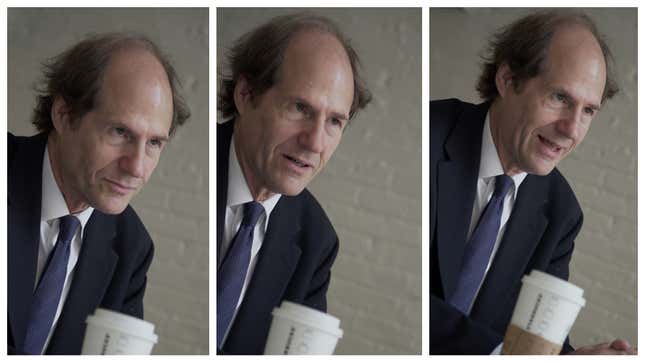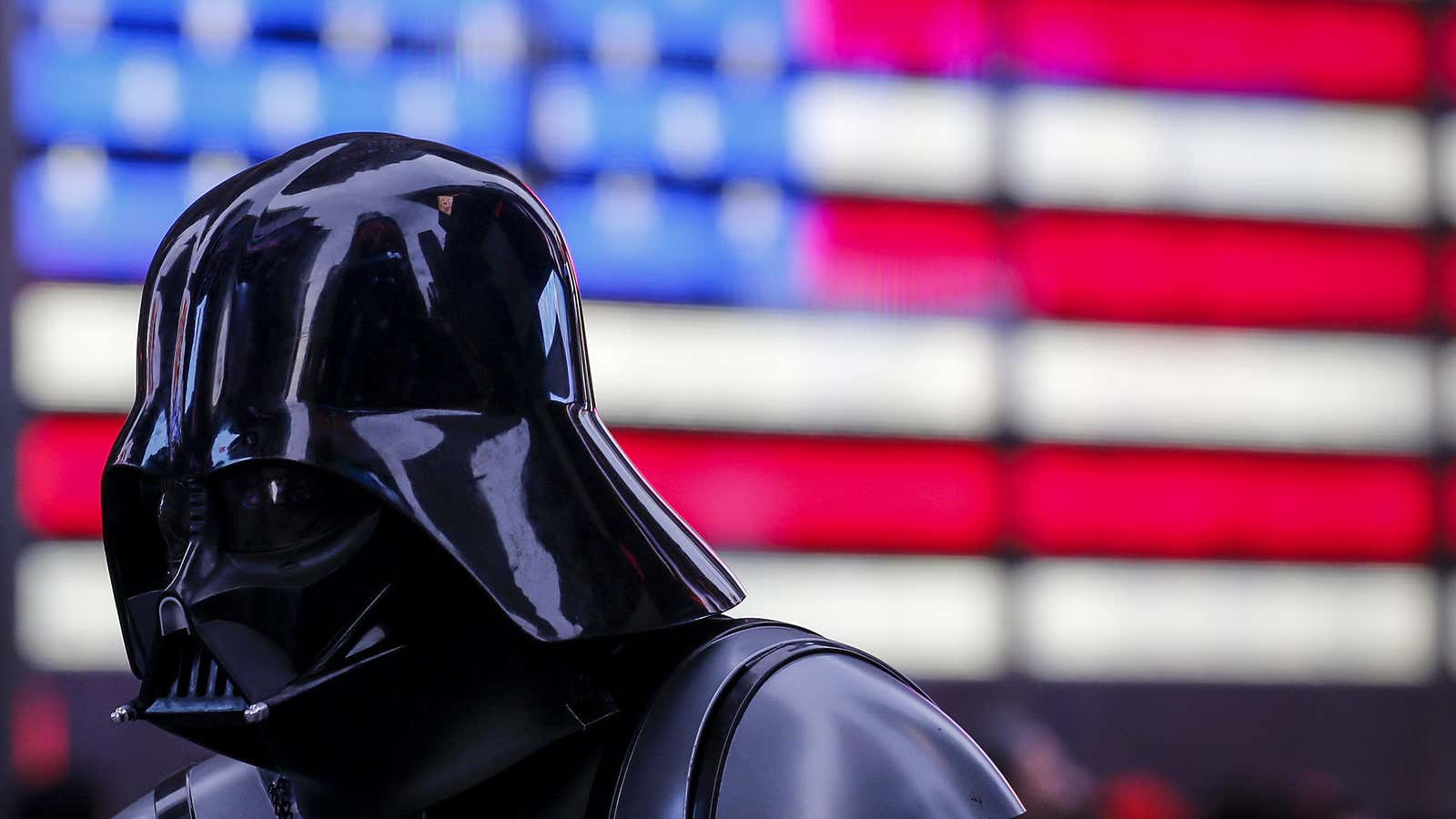If it weren’t for former University of Chicago colleague Barack Obama, Cass Sunstein might be the most well-known constitutional law professor of his generation.
With a long career as a writer, academic, public intellectual, and government official, Sunstein has developed a unique reputation for blending legal scholarship, social science research, philosophy, and economics into practical approaches that can be used to inform and improve American public policy.
He’s perhaps best known for the work he did with behavioral economics pioneer Richard Thaler, with whom he wrote the 2008 best-seller Nudge. That book argued that by using the power of behavioral economics, policy makers, business people, and other “choice architects” can steer people toward decisions that maximize their well-being.
His latest book is a bit different. It’s called The World According to Star Wars.
Yes, Star Wars. Sunstein takes the universe George Lucas first brought to the big screen in 1977 and applies it as a lens on a wide range of issues, from constitutional law—the evolution of which he likens to JJ Abrams writing a new episode of the Star Wars universe—to the fundamental nature of personal choice and the perennial struggles of parenthood.
Sunstein sat down with Quartz at our New York offices to talk about the power of the Star Wars narrative and how our culture and even our politics fit into it. The following excerpts from our conversation were edited lightly for clarity.
Quartz: In this era of fragmentation, Star Wars remains a mass-media phenomenon. Is that why you wrote about it?
Sunstein: I wrote about it because my little boy, then five years old, got obsessed with it. And his obsession was contagious.
The fact that the movies connected my little boy and me is connected with your point, which is that the movies do link people, across generations and across geographies. When I first started thinking maybe I would write about Star Wars, so many people started smiling. They were sometimes people from Denmark or Taiwan. And sometimes they were 23-year-old students or young people starting in business, or they were 70-year-olds who had taken their now-grown children to see Star Wars. It really felt like I was talking about writing a book about July 4th, maybe 12 years after the American revolution, in the sense that it was just really a focal point.
This book is dedicated to my little boy and my four-year-old daughter, who actually is the hero of the whole book. I won’t spoil the surprise about why. She plays a big role. And I have a big daughter who’s in her 20s, and the best lines in the book come from her. I’ve actually talked to her a lot about her childhood and seeing Star Wars in her childhood. Most of the things I work on are completely unrelated to being a dad. And this one, one of the things about it is it’s completely related to being a dad.
In terms of connecting the American culture, is there anything else that you can think of that rivals Star Wars? Maybe the NFL?
Sometimes sports. I grew up in Boston and you think about David Ortiz, or Carl Yastrzemski, or Ted Williams. In the culture of Massachusetts, these are heroic figures whom people think about across generations.
Our politics, interestingly, are so polarized that it’s hard to think of a political example. Reagan is an icon among conservatives, and many liberals now, I think, admire him. But it doesn’t bring a smile of connectedness to people’s faces in the universal way that Star Wars does.
The Force Awakens, if you don’t adjust for inflation, made more money than any movie in North American history. There’s been a real spark of new interest. It’s hard to think of anything in culture that is like that.
Did you talk to Lucas at all for the book?
I did no interviews on the book.
I did have an opportunity to talk to George Lucas once at a large event. And my recollection is that someone said to him, “Cass is writing a book on Star Wars.” And I think his response was, “Isn’t everybody?”—which he said charmingly. And he really wanted to talk about public policy and the role of the United States in the world.
I think one thing George Lucas probably does not need is some law professor coming up and saying, “What did you mean when you had Jabba the Hut grimace in that way?” He probably doesn’t need that.
Your book mentions Antonin Scalia, the former US Supreme Court justice, and your former colleague at the University of Chicago. You liked him, and compare him to a Jedi master. You also say in the book that even Jedi masters get it wrong sometimes. How was Scalia a Jedi master? And I should bring up, you don’t say which kind of Jedi master he was. The light or the dark?
Justice Scalia was such a good person. Even though his views aren’t ones that I usually agreed with, he’s a Jedi, not a Sith. And I’d say what makes him a Jedi is, first, his character; second, his generous and warm wit. Third, I think he’s one of the three greatest writers the Supreme Court has ever had, along with Robert Jackson and Oliver Wendell Holmes. Fourth, in the areas that didn’t involve his own political, let’s say, or jurisprudential commitments that are most contentious, he really did tremendous work in important technical areas.
You know at justice Stephen Breyer’s swearing in, I was there at the White House, as was Scalia, and he put his arm around me and said, “Cass, first Ruth and now Steve? It’s almost enough to make me vote Democrat.” And that kind of captures him. He was teasing me, almost, but also acknowledging these are good judges and good people, which I think the country could use a lot more of.

I think what he got wrong was that constitutional law just isn’t a search for the original understanding. It’s a continually unfolding narrative in which justices are creating new episodes. And justice Scalia was actually a terrific creator of new episodes.
And it’s odd to say it, but I think an understanding of how the Star Wars saga was created helps illuminate why the idea of uncovering the original understanding—whether you’re talking about movies, or novels, or constitutional law—is not the way to think about it.
I can see how it all weaves together. In both, there’s this notion that there is an ur-text—whether its Lucas’ first treatment of the Star Wars script or the drafters’ original intent—that exists somewhere.
The first part of the book that I wrote first was the constitutional law chapter. That was what first intrigued me. It was the idea that in a case involving free speech or abortion, you’re really writing a new episode … [and] when you write a new episode, you have to be faithful to what came before. You can’t just say, “Well, that was all a dream.” You have to respect it. But you also can go in multiple new directions.
For more than 200 years, the Constitution has represented the power of democracy and elected government. Some of that may be mythologized, of course, but I’ve been really disturbed by how many people are willing to flirt with some of the more authoritarian stuff that Donald Trump seems to be talking about in his presidential campaign. So is Donald Trump Darth Vader?
I would say that Mr. Trump is a person with a long career in business, who has convictions of various sorts, and evidently touched a nerve with some part of the American public.
He’s certainly not Darth Vader. He’s not torturing people. Though he has supported some things that are plausibly characterized as torture.
He’s speaking for a segment of the electorate, it appears, but in a way that is in great tension with American traditions both on the Democratic and Republican sides. So he would pose a unique challenge for our institutions and our democracy, on the basis of his statements.
My own hope is that he will have a very long and successful business career and create lots of jobs in real estate and other activities, and that he will not live at 1600 Pennsylvania Avenue.
